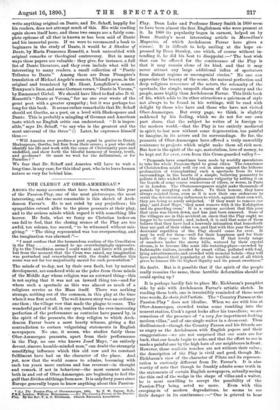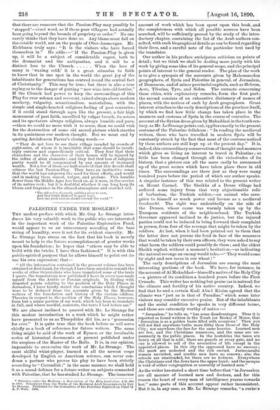THE CLERGY AT OBER-AkIIIIERGA1J.* AMONG the many accounts that have
been written this year of the Passion-Play, one of the most picturesque, the most interesting, and the most reasonable is this sketch of Arch- deacon Farrar's. He is not ruled by any prejudices ; his sympathies extend alike to the pious peasants at their play, and to the serious minds which regard it with something like horror. He feels, what we fancy no Christian looker-on can fail to feel, that the closing scenes of the Play are too awful, too solemn, too sacred, " to be witnessed without mis- giving." " The thing represented was too overpowering, and the imagination was alarmed :"— " I must confess that the tremendous realism of the Crucifixion in the Play seemed to me overwhelmingly oppressive. Up to the Crucifixion scene I could watch and listen with profit ; but from the moment that the Cross was raised, my imagination was perturbed and overwhelmed with the doubt whether this scene was not far too majestically sacred for such presentation."
The minds of to-day, not by their own fault, but by natural development, are sundered wide as the poles from those minds of the Middle Age whose religion was an outward thing—this is not saying that it was not an inward thing too—and for whom such a spectacle as this was almost as much of a religious service as the Mass itself. There was nothing strange, nothing out of the common, in this play at the time when it was first acted. The well-known story was an ordinary one then ; the village vow that made the plague to cease. The wonderful part of it all, in our eyes, besides the ever-increasing perfection of the performance as centuries have passed by, is the spirit of the peasants, the deep religion to which Arch- deacon Farrar bears a most hearty witness, giving a flat contradiction to certain vulgarising statements in English newspapers. No one, it seems, who studies fairly these Ober-Ammergau peasants, apart from their performance in the Play, no one who knows Josef Mayr, " an entirely devout, sincere, humble-minded man," can doubt the strangely sanctifying influence which this old vow and its constant fulfilment have had on the character of the place. And yet, now that the world comes to admire, becoming with each ten years more curious and less reverent—in thought and remark, if not in behaviour—the most earnest minds, both in and out of Ober-Ammergau, are beginning to feel the gulf that divides oldthings from new. It is onlyforty years since Europe generally began to know anything about this Passion-
'6 (1.) The Passion-Play at Oberammergau, 1890. By F. W. Farrar. D.D., E.R.B. London William Heinemann.—(2.) The Country Parson at the Passion- Play. By the Rev. F. A. G. Eichbanm. Church Extension Association. Play. Dean Lake and Professor Henry Smith in 1850 seem
to have been almost the first Englishmen who were present at it. In 1860 its popularity began in earnest, helped on by
Dean Stanley's most interesting article in Macmillan's Magazine, of which Archdeacon Farrar here gives a resume. It is difficult to help smiling at the hope ex- pressed by Dean Stanley, one which, of course without in-
tending it, he did his best to disappoint The best wish that can be offered for the continuance of the Play is that it may remain alone of its kind, and that it may never attract any large additional influx of spectators from distant regions or uncongenial circles." No one can appreciate the beauty of the scene, the natural perfection and deep religious reverence of the actors, the solemnity of the spectacle, the simple, unspoilt charm of the country and the people, more highly than Archdeacon Farrar. This little book of his, which adds to its other attractions a quietness of style not always to be found in his writings, will be read with delight by those who have and those who have not visited Ober-Ammergau. . But every page, we think, is slightly saddened by his feeling, which we do not for our own part share, that the subject he writes of is foreign to the modern world,—that 'the Play is too entirely mediaeval in spirit to last now without some degeneration, too painful to imagine, in its actors and its surroundings. So far, the peasants of Ober-Ammergau have offered a truly unworldly
resistance to projects which might make them all rich men. But how is the spirit of the age, materialism, love of money, to be kept out for ever, even from this Cross-guarded valley P- " Proposals have sometimes been made by worldly speculators to take the whole Passions-Spiel to great cities. The conscience of Christendom might well cry out in alarm against the hideous profanation of transplanting such a spectacle from its true surroundings in the hearts of a simple, believing peasantry to pollute it into wicked and blasphemous vulgarity by setting it on the boards of some coarse rendezvous of idlers, or worse, in Paris or in London. The Oberammergauers might make thousands of pounds by accepting such offers. To their honour, they have always resisted them, even as it is now their one endeavour to resist the deteriorating influences to which, against their own will, they are being so sorely subjected. If they want to remove our play,' said Josef Mayr, they must remove with it the Bofelspitze and its guarding cross.' It is a curious accident that this year that cross was blown down, and has just been renewed. Some of the villagers see in this accident an omen that the Play ought no longer to be continued ; and, indeed, it is said that some of them believe that they have had a heavenly intimation that henceforth they are quit of their olden vow, and that with this year the public decennial repetition of the Play should cease for ever. It may be well for them—well for their happiness and for their faith—if they come to this decision. If that lovely range of meadows under the snowy hills, watered by their crystal stream, is to become like some idle watering-place—crowded by fashionable visitors, invaded by smart villas, polluted with foul, lying advertisements, and crowded with monster hotels—they will have purchased their popularity at the terrible cost of all which gives to human life its highest dignity and its purest sweetness."
No doubt. But is it possible that if the spirit of the people really remains the same, these horrible deformities should or could spring up ?
It is perhaps hardly fair to place Mr. Eichbaum's pamphlet side by side with Archdeacon Farrar's artistic sketch. In reading them both, one is irresistibly reminded of those most
true words, Le choice fait l'artiste. The " Country Parson at the Passion-Play " does not idealise. When we are with him at Ober-Ammergau, crowded trains come rambling into the nearest station, Cook's agent looks after his travellers; we are conscious of the presence of " a very few impertinent-looking modern villas," and of one single waiter in a dress-coat. Thus
disillusioned—though the Country Parson and his friends are as angry as the Archdeacon with English papers and their exaggerations—we are not surprised that our seats are far back, that our heads begin to ache, and that the effort to see is made a painful one by the high bats of our neighbours in front.
However, these realistic touches are not without their value ; the description of the Play is vivid and good, though Mr. Eichbaum's view of the character of Pilate and its represen- tation is curiously different from Dr. Farrar's. It is also worthy of note that though he frankly admits some truth in
the statements of certain English newspapers, actually seeing the thin end of the wedge in the shape of villas and a waiter, he is most unwilling to accept the possibility of the Passion-Play being acted no more. Even with this creeping-in of modern degradations, he seems to see little danger in its continuance :—" One is grieved to hear that there are rumours that the Passion-Play may possibly be stopped'—cruel word, as if these poor villagers had actually been going beyond the bounds of propriety or order." No one surely thinks that they have done so. Any blame must fall on the outside world, not on the people of Ober-Ammergan. Mr. Eichbaum truly says : " It is the visitors who have forced themselves in." He adds :—" If the Passion-Play is given up, it will be a subject of considerable regret, both to the dramatist and the antiquarian, and it will be a distinct loss to the Church When the love of many is ` waxing cold,' it is a great stimulus to faith to know that in one spot in the world the great joy of the inhabitants for generations has centred round the central fact of Christianity." This may be true ; but there is also a true saying as to the danger of putting " new wine into old bottles." If the Church had power to keep the surroundings of this Play for ever solemn and reverent, raised always above modern mockery, vulgarity, sensationalism, materialism, with the simple and single-hearted religions feeling of past centuries ; if it could stand through ages like the present, a fair high monument of past faith, unsullied by vulgar breath, its actors and its spectators always religious, always humble and pure, —then we could no more wish it to cease, than we could wish for the destruction of some old sacred picture which startles in its quaintness our modern thought. But we must end by quoting Archdeacon Farrar's closing words :-
" They do not love to see their village invaded by crowds of sight-seers, of whom it is inevitable that some should be insult- ingly curious and superciliously critical. They fear that their characters and the character of their homes will be injured by the influx of alien elements ; and they feel that loss of religious purity would be ill compensated by any amount of increased wealth. Not a few of them are half-resolved that this decade shall witness the last Passion-Play. They have an instinctive sense that the world has outgrown the need for their efforts, and would end in making them unreal, vulgar, and profane. This humble flower from the Middle Ages has lived on, as it were, in the crevice of its native rock; but it is doubtful whether it can long keep its bloom and fragrance in the altered atmosphere and crowded soil.
The old order changeth, yielding place to new, And God fulfils Himself in many ways, Lest one good custom should corrupt the world '''



































 Previous page
Previous page